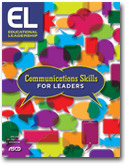Difficult conversations—we've all experienced them, both in and out of school. Instead of procrastinating, or sidestepping them, or worse, botching them entirely, here's how to address conflict when the stakes and tensions are high.
1. Begin with the end in mind.
Know what you're hoping for. If there's no goal in sight, you're likely to run in circles, waste time, and descend into a spiral of frustration and conflict. If a parent initiates the meeting, try to find out what the parent is hoping to achieve. If a faculty member has requested it, meet informally beforehand to clarify the goal.
2. Consider where people will sit.
We often draw invisible lines and boundaries in meetings. The person sitting at the head of the table is presumed to be the one with all the power. By the same token, one group may lay claim to one side of the table, with the other group or individual relegated to the other side. A parent or faculty member coming into a meeting on "the other side" of the table will automatically be defensive. It's much harder to be defensive if the person who's leading the tough conversation is sitting next to you as an ally.
3. Let the other person speak first.
When we speak first from our podium of authority, we give the other (angry, dismayed, frustrated) person the opportunity to shoot down our thoughts or professional opinions. Letting the other party speak first gives you a verbal advantage because it enables you to find points of agreement, however small they may be.
4. Sit with the silence.
When someone says something meaningful and silence follows, let the silence continue so the profundity of the thought can sink in. Out of discomfort with the silence, we often fill the vacuum with idle words. If you decide to speak, ask yourself, Is what I'm saying truly useful to the party concerned and to this issue? If not, hold your tongue.
5. Listen.
We often assume that a parent or faculty member is looking for a "fix" to a problem. Some chronic issues can't be fixed—and certainly not in a single meeting. So listen without offering suggestions. Empathize instead, meaning try to understand the underlying emotions. Empathizing can fix a conflict without fixing the problem.
6. Look beyond the anger.
In a difficult conversation, it's easy to see when the other party is angry. However, calling attention to that anger is neither useful nor productive because anger doesn't occur in a vacuum. Look for deeper emotions and note those instead: "You must be sad about how you feel your child was treated." "That situation must have been frustrating for you." By digging deeper, you'll often strike a nerve of empathy on which to build.
7. Decide whether an issue is worth fighting for.
Assess the importance of the issue. Is this the hill you want to die on? If it's worth the fight, then go for it. But if you think that sacrificing here will enable you to realize greater gains down the road, hold back and preserve the relationship.
8. Don't rationalize emotions.
Rationalizing with someone who's thinking from an emotional frame of mind is akin to trying to nail Jell-O to a wall. It can't be done. We often react to a provoking statement by thinking or exclaiming, "That doesn't make sense! What you're asking for is unreasonable!" Instead, listen, empathize—and wait. Don't try to use rational viewpoints until the person begins speaking from a less emotional perspective.
9. Avoid trigger words and phrases.
Words that express absolutes—such as can't, won't, never, and always—can trigger people, as will the word but, which all but cries out your objections. Rehashing certain phrases—such as problem child—will do the same. Look for words that state facts as opposed to judgment. Better to say, "your child has been out 15 days" than "your kid is chronically absent." Using phrases like "help me understand" signals that you're genuinely interested in getting to the bottom of the issue.
10. Think in terms of liability.
Tough meetings mean potentially tough consequences. Try to have another person present to witness. Follow all protocol of your board policy, law, and ethical codes and document the meeting.


